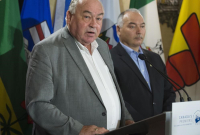Support strong Canadian climate journalism for 2025
The new premier of the Northwest Territories tells a story when asked about how her government will differ from that of her predecessor.
Caroline Cochrane, chosen Thursday by her fellow legislature members in the territory's consensus government, grew up as one of eight kids in a Metis household.
"At the table, no child got more than the other," she said in an interview shortly after her third-ballot victory.
"Each child got the same bowl of stew. If there was leftovers, then they would look at it."
It's her way of saying she wants to rebalance the emphasis between the infrastructure and development-heavy administration of her predecessor Bob McLeod — who did not run in the recent election — and the needs of social services and education.
"We've kind of top-loaded in infrastructure. When you top-load in any one program, all of the others suffer.
"What you'll see different is that everyone needs to have a piece of the pie and when there's extra, then that will be put into the program that best meets the needs of people."
Or, as she told her fellow MLAs after they voted her in, "We will make this next four years the most progressive government in the Northwest Territories."
Prime Minister Justin Trudeau said in a statement he looks forward to working with his new colleague.
"Together, we will make life more affordable for families, and make it easier for them to find a place to call home. We will also bring clean power to more communities, and connect them to the reliable, high-speed internet they need."
Cochrane, who represents a Yellowknife electoral district, becomes the first woman to lead the N.W.T. since Nellie Cournoyea left the job in 1995. Cochrane's new position reflects the makeup of the new assembly, in which nine women were victorious in a territorial election earlier this month.
The legislature was to select a territorial cabinet later Thursday. Cochrane will then assign portfolios.
Cochrane, who is Metis, was first elected in 2015 and served in a variety of cabinet posts, most recently in education, culture and employment. She also led the Campaign Schools for Women to promote and support women being elected to all levels of government.
Before entering politics, she worked for 20 years as a social worker with agencies that supported high-risk families.
That background will be reflected in an emphasis on education and social development.
"I believe education is the key," she said. "You will see a strong focus on programs for people."
The N.W.T.'s resource-focused economy has been faltering. Cochrane promised economic development will not be neglected. Diamond mines may be winding down, but there are more resources where they came from, she said.
"We have many, many resources that are untapped."
Modern mining is much more environmentally sound than in the past, she said.
She said the N.W.T. has made its peace with carbon pricing and is eager to move forward with other climate-friendly initiatives, such as reducing the dependency of remote communities on diesel power generation through solar, wind and hydro.
Consensus government, with its lack of parties, is supposed to be more co-operative. But MLAs outside the cabinet function as a kind of opposition, and friction between cabinet and the regular members has been a regular feature of past legislatures.
Cochrane, 59, promises an approach a little more like her family's old dinner table.
"My commitment is much more consultation.
"Being in a consensus government gives us the liberty to sit at any table and not feel threatened. The key within that is relationships with all governments."
This report by The Canadian Press was first published Oct. 24, 2019.






Comments